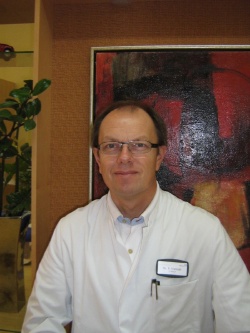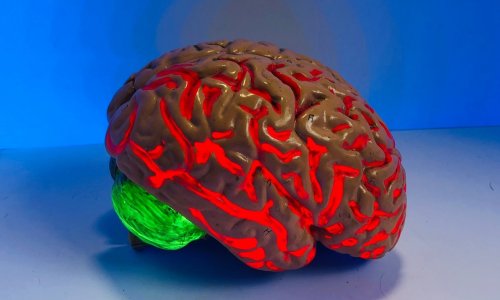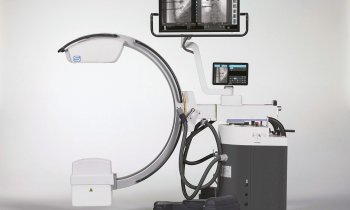Psycho-oncology in practice
Could a patient’s state of mind affect cancer recovery?
Having cancer is an extremely complex experience for those people concerned. Alongside the purely physiological aspects, those suffering from cancer find themselves in a highly threatening and an entirely different situation in life. In the past, classical medicine has concentrated on the treatment of the carcinogenous changes. But what role does the patient’s psyche play in treating the illness?

Is there also a link to psychosocial factors in the treatment of cancer patients? Are there perhaps even some patients who have a better or worse chance of survival due to their basic mental conditioning? How closely are the psyche and social components linked to one another and to what extent do they have an influence on the recovery process? Psycho-oncology is a relatively new science that searches for answers to those questions. Questions that are often difficult to answer because every oncological illness is different and the variables are highly diverse in nature. In addition, there is the fact that only those prospective studies that are difficult to conduct allow causal conclusions to be drawn.
‘It’s likely that there are many aspects where a generally accepted answer will probably never be found,’ says Peter Trunzer MD, head physician at the MediClin Kraichgau-Klinik and specialist in the rehabilitation of oncological illnesses. ‘The widely held belief among the general population that the psyche can trigger cancer does not appear to be confirmed by the current state of scientific knowledge. Nevertheless, we observe factors in day-to-day medical practice that positively influence the course of the illness. On the one hand, there are psychosocial variables and, on the other, the strategies employed by patients for coping with their illnesses.’ This has been confirmed by numerous studies carried out over the last few years. For the person concerned, a cancer diagnosis is associated with a death threat, an attack on their physical well-being, and a loss of autonomy, often with social isolation and the evaporation of a person’s self esteem.
The first task for these people is to dig themselves out of this hole. ‘If the patient receives an intensive level of emotional support from their partner or family, then this has been shown to have positive effects on the further course of the disease. The patient is ultimately less stressed,’ Dr Trunzer points out. Permanent stress has a negative effect on a person’s attitude to life and on the body’s own defences. It is particularly when faced with illness of this kind that the sufferer needs their physical and psychological strength in order to be able to cope with the effects of the cancer therapy – exhaustion, reduced retentiveness, sexual disorders, etc. ‘All too often we must take on the role of the family. Changes in society have weakened family structures. And, particularly in large cities, we experience a high number of singleperson households. In addition to psychotherapeutic approaches, we place a particular focus on precisely this aspect when training our personnel.
The objective is to lovingly support and stabilise those patients in rehabilitation. However, this can only succeed if psychotherapists, clinic personnel and the clinicadministration are all pulling together. We follow this approach because we experience the successes in day-to-day medical practice.’ Newer studies have produced results supporting the practical experiences of engaged medicine. In the area of research there are also high hopes for the positive effects of tailor-made psychological and psychotherapeutic measures. Initial research findings on the psychological variables of the progression of illness in cancer patients substantiate Dr Trunzer’s practical experience. A further aspect is increasingly becoming the focus of current research studies: coping with the diagnosis. ‘Our experience shows that patients who fight for their lives and deal head-on with their illness have a positive outlook on life. They perceive the strenuous treatments as a sensible means to an end. Cancer patients who give up the fight experience increased pain, become exhausted more quickly and their perceived quality of life is significantly lower,’ observes Dr Trunzer, who had cancer himself 20 years ago.
In a 2003 study of melanoma patients it was possible to prove the positive influence of active-cognitive coping on the further development of the illness. Patients following passive coping strategies displayed a significantly lower chance of survival. ‘We support our patients with a variety of measures for actively coping with illness. Alongside aspects for promoting a healthy lifestyle – nutrition, exercise and addictive behaviour – we also support our rehabilitation patients, in particular, on a psychological level in terms of coping with fear. The aim is to take up the fight, meaning to listen to the body, develop more awareness for a person’s specific needs and to reduce stress levels.’ Those cancer sufferers with a fundamentally positive outlook find this approach easier than pessimists.
The team at the MediClin Kraichgau-Klinik is convinced of the importance of psycho-oncological support. ‘Our goal is to promote the recovery process of our patients at a fundamental level. Therefore, we use every opportunity to set the right course for a constant improvement of an individual’s quality of life and their capabilities,’ confirms Michael Schmid, Business Director of the MediClin Kraichgau-Klinik in Bad Rappenau. ‘The basis for our success is the interdisciplinary approach, which sees all of our skilled personnel in the clinic applying their expertise for the good of the patient. Psychooncological treatment aims to draw upon the human care and attention that holds a position of great importance in our clinics. We support our patients on a daily basis in their fight against cancer – often with success.’
MediClin Kraichgau-Klinik
The MediClin Kraichgau-Klinik in Bad Rappenau, Germany, specialises in cancer rehabilitation and chronic pain disorders. Founded in 1962, the clinic has been part of MediClin AG, which has operated 34 clinics, seven nursing care facilities and ten medical care centres since 2008. Therapeutic specialities at the 216-bed clinic in Bad Rappenau include subsequent nursing treatment and care for patients suffering tumours, the rehabilitation of chronic pain disorders and therapy for metabolic diseases.
Commenting on its awards – the RAL Quality Mark and the EQR Certificate – Excellent Quality in Rehabilitation – the clinic said: ‘The objective of all treatment at the MediClin Kraichgau-Klinik is the improvement in the individual quality of a patient’s life. A holistic therapeutic approach plays a fundamental role in achieving
this aim.’
Source: MediClin Kraichgau-Klinik
20.06.2011






